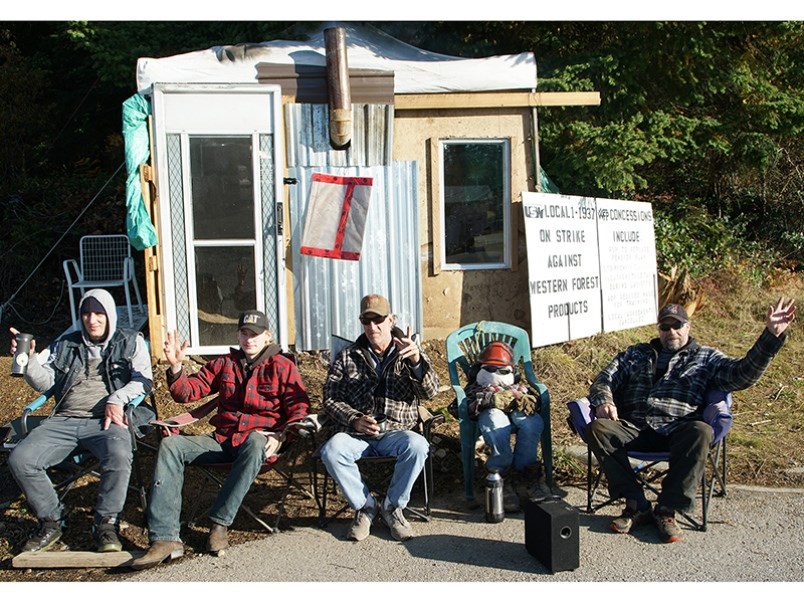Western Forest Products was disappointed to learn from independent mediators Vince Ready and Amanda Rogers that after 14 hours of weekend bargaining, talks were over, and no new talks are scheduled, according to president and chief executive officer Don Demens.
He stated in a media release on Monday, November 18, that the company’s proposal maintains the terms of the previous collective agreement while providing more money than recent industry agreements in the form of an up-front signing bonus of $2,000 and enhanced benefits.
“We have also removed any item that could be viewed as concessionary,” stated Demens. “To get people back to work as soon as possible, we asked the United Steelworkers (USW) bargaining committee to take this offer to the membership to vote on it. We also told both the mediators and the USW bargaining committee that we would be willing to have our employees return to work during the voting process. The USW bargaining committee rejected these proposals. No future bargaining dates have been set.”
Demens stated the proposed agreement is for a five-year term from 2019 to 2024. He added that this term matches recent interior forest industry collective bargaining settlements and is less than recent coastal pulp industry agreements.
“It provides labour certainty for employees, our customers, Western’s contractors and communities,” stated Demens.
Western offered an up-front signing bonus of $2,000 and wage increases of two per cent for the first four years and 2.5 per cent in the final year. Additional wage increases are included for charge hands, hook tenders, first aid attendants, operators of tethered equipment and for those working afternoon or evening shifts.
“As a result, under this proposal, beginning wages would increase to $30.07 per hour in the first year and move to $32.71 by the end of the agreement,” stated Demens. “Similarly, the highest paid individual would increase to $54.40 per hour in the first year and make $59.17 by the end of the contract. In addition to these increases, you would receive full health and welfare benefits, pension and applicable premiums.”
The USW bargaining committee’s position continues to be entrenched, demanding a shorter term and wage increases that are nearly 40 per cent higher than established industry agreements and would eliminate current shift flexibility, which is required to operate the business, stated Demens.
“Western carefully considered all the committee’s proposals, including demonstrating openness to a four-year term,” stated Demens. “However, in an industry already challenged to compete in global markets, the committee’s proposals in their entirety are not sustainable; challenging future capital investment, decreasing operational certainty and restricting our ability to operate efficiently. While we are doing everything we can to end the strike, we must also protect the future of our business so we can continue to employ thousands of people in BC.
“Given these circumstances, it is important we work collaboratively to bring this labour dispute to an end.”
Western remains willing to honour this proposal, go to binding arbitration, or to explore other opportunities to end this strike and get employees back to work, according to the release.
“We are urging the USW bargaining committee to reconsider its decision and allow employees to vote on this offer or enter binding arbitration so we can return people to work as soon as possible,” stated Demens.
According to a media release from USW Local 1-1937, it is unfortunate, but not surprising that WFP walked away from the bargaining table again.
“The result is that more time has now been wasted in game playing, rather than getting on with the serious issue of collective bargaining,” the release stated. “The union’s leadership group has passed a unanimous motion directing the bargaining committee to reject WFP’s proposal in its entirety. The leadership group further stated that WFP should stop the delaying tactics and get back to the mediation table.”
The release also stated that the proposal made by WFP is a desperate attempt and has failed to undermine the solidarity of the members.
“Our members remain united in our effort to reach a fair agreement for the coastal forest industry,” according to the USW release.
The last wage proposal for USW was for a four-year contract at three per cent increases for the first two years and 2.5 per cent increases for the final two years.
The union states that Demens makes a misleading statement that the union’s wages are nearly 40 per cent higher than any established industry agreements.
“Our last proposal was 11 per cent over four years, which is only three per cent higher than the eight per cent over four years WFP has proposed,” stated USW. “WFP’s proposal completely ignores all of our membership’s proposals and key issues, which we have been fighting for, therefore, their proposal is rejected by the USW Local 1-1937 bargaining committee.”



